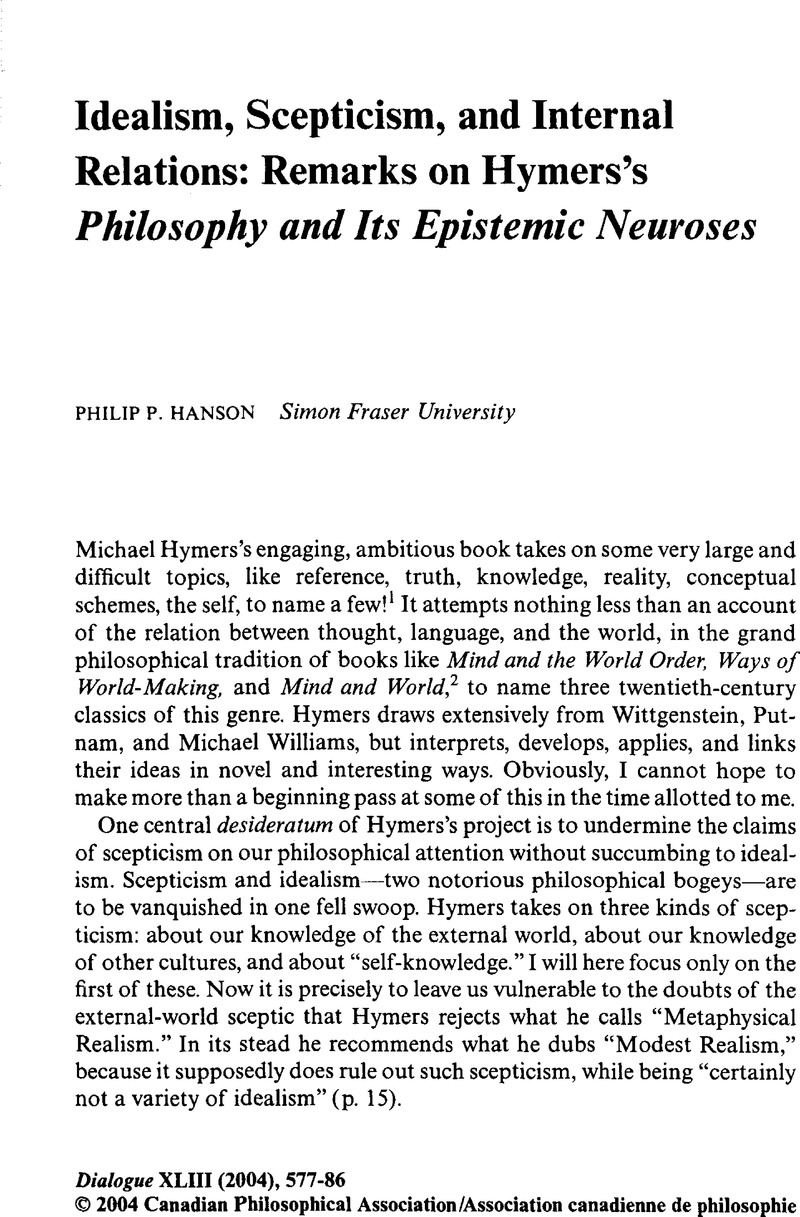Article contents
Idealism, Scepticism, and Internal Relations: Remarks on Hymers's Philosophy and Its Epistemic Neuroses
Published online by Cambridge University Press: 13 April 2010
Abstract

- Type
- Interventions/Discussions
- Information
- Dialogue: Canadian Philosophical Review / Revue canadienne de philosophie , Volume 43 , Issue 3 , Summer 2004 , pp. 577 - 586
- Copyright
- Copyright © Canadian Philosophical Association 2004
References
Notes
1 Hymers, Michael, Philosophy and Its Epistemic Neuroses (Boulder, CO: Westview Press, 2000)Google Scholar. This is a substantial revision of a critical commentary presented at the Western Canadian Philosophical Association Meetings in Edmonton in October 2000. I would like to thank those present on that occasion, and especially Michael Hymers, for their helpful feedback and clarification. This version has also benefited from Jill Mclntosh's close reading. All page references appearing in the main body of the text are to Hymers's book.
2 Lewis, C. I., Mind and the World Order (New York: Dover, 1929)Google Scholar; Goodman, N., Ways of World Making (Indianapolis, IN: Hackett Publishing, 1978)Google Scholar; and McDowell, John, Mind and World (Cambridge, MA: Harvard University Press, 1994).Google Scholar
3 This distinction is introduced in Sosa's, Ernest “The Raft and the Pyramid: Coherence versus Foundations in the Theory of Knowledge,” in Midwest Studies in Philosophy, Vol.5: Studies in Epistemology (Minneapolis, MN: University of Minnesota Press, 1980), pp. 3–25.Google Scholar
4 Presumably by “an” understanding, Hymers means “my” understanding.
5 See, for instance, AQ: The Magazine of Simon Fraser University (October 2000), Frontispiece, and the article by Yosef Wosk, “The Philosopher's Cafe: A Conversation Whose Time Has Come.”
6 See Cohen, Stewart, “How to Be a Fallibilist,” Philosophical Perspectives, 2, Epistemology (1988): 91–123CrossRefGoogle Scholar; Lewis, David, “Elusive Knowledge,” Australasian Journal of Philosophy, 74, 4 (December 1996): 549–67CrossRefGoogle Scholar; and de Rose, Keith, “Solving the Skeptical Problem,” The Philosophical Review, 104, 1 (January 1995): 1–52.CrossRefGoogle Scholar
7 The term is borrowed from James, William, The Will to Believe (New York: Longmans, Green, 1897).Google Scholar
8 Elgin, Catherine, “The Epistemic Efficacy of Stupidity,” Synthese, 74 (1988): 297–311.CrossRefGoogle Scholar
- 1
- Cited by


